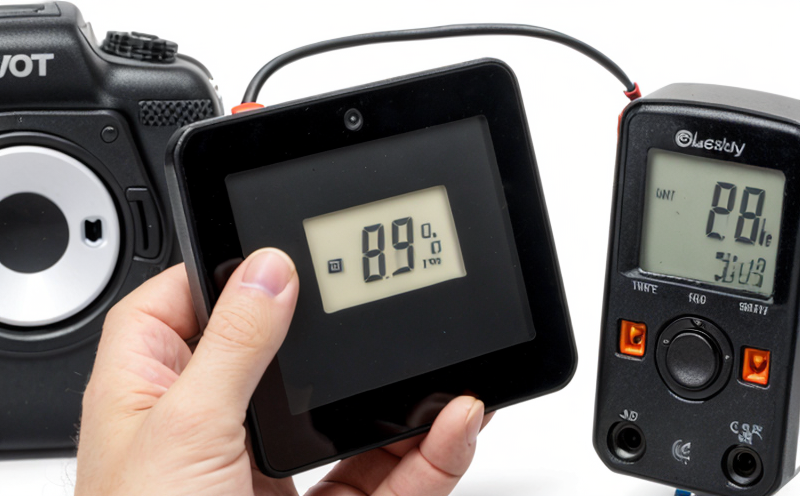Bluetooth Connectivity Testing of Small Devices
In today’s interconnected world, Bluetooth technology has become indispensable in consumer electronics and small devices such as wearables, smart home gadgets, and portable audio equipment. Ensuring reliable Bluetooth connectivity is crucial for maintaining user satisfaction and product safety compliance.
Bluetooth testing involves a series of rigorous checks aimed at validating the robustness and performance of Bluetooth hardware within specific devices. This service ensures that products meet industry standards and are safe for consumer use. Testing covers various aspects including signal strength, connection stability, interference resilience, data transfer rates, and battery consumption during connectivity.
Our team of experts utilizes state-of-the-art equipment to simulate real-world conditions under which Bluetooth devices operate. This includes testing in diverse environments such as urban areas with high electromagnetic interference (EMI) levels, rural settings with poor signal coverage, and industrial zones where multiple wireless networks compete for bandwidth.
The importance of Bluetooth connectivity cannot be overstated; it directly impacts user experience and product reliability. A single instance of dropped connection or slow data transfer can significantly erode customer trust in your brand. Our comprehensive testing ensures that these issues are identified early, allowing manufacturers to address them before the products reach market.
For quality managers and compliance officers responsible for ensuring adherence to regulatory requirements, our Bluetooth connectivity tests provide peace of mind knowing they meet relevant standards such as ISO/IEC 17025:2017. R&D engineers benefit from detailed insights into how different design choices affect performance metrics like latency or throughput. Procurement teams gain reassurance that the components used in their products are reliable and perform consistently across various conditions.
Our testing process adheres strictly to international standards such as IEEE 802.15.1, which defines Bluetooth specifications. By aligning with these benchmarks, we ensure our tests are both comprehensive and internationally recognized. This alignment also helps clients comply with local regulations governing wireless communications devices.
It is essential for manufacturers to understand the implications of non-compliant products on their brand reputation and financial health. Non-conforming Bluetooth devices can lead to recalls, legal action, and reputational damage. Investing in thorough testing early in the development cycle prevents these costly mistakes and enhances overall product quality.
Scope and Methodology
| Test Parameters | Description |
|---|---|
| Signal Strength | Measures the received signal level to ensure adequate connection. |
| Connection Stability | Evaluates the reliability of connections under various conditions. |
| Interference Resilience | Assesses ability to maintain connection in presence of EMI. |
| Data Transfer Rates | Determines the speed at which data is transmitted over Bluetooth links. |
Our team employs specialized software and hardware to conduct these tests. Signal strength is measured using advanced spectrum analyzers capable of detecting even faint signals. Connection stability is evaluated through continuous monitoring of connection intervals under varying network conditions. Interference resilience tests involve exposing devices to known sources of electromagnetic interference and observing their performance.
Data transfer rates are assessed by transferring large files between paired devices while measuring the time taken for completion. This data is then compared against expected values based on device specifications. All results are meticulously documented and reported according to agreed-upon formats, ensuring transparency and traceability throughout the testing process.
Industry Applications
- Wearable devices
- Smart home gadgets
- Portable audio equipment
- IoT sensors
The applications of Bluetooth connectivity testing extend beyond consumer electronics into industrial IoT (IIoT) and healthcare sectors. In industrial settings, reliable Bluetooth connections enable seamless integration between machinery and management systems, enhancing operational efficiency.
In the healthcare sector, wearable devices must maintain stable Bluetooth connections to transmit vital signs data accurately. Ensuring these connections are robust is critical for maintaining patient safety and compliance with medical device regulations such as ISO 13485:2016.
Our testing also supports manufacturers of IoT sensors who rely on Bluetooth technology to extend battery life while providing real-time data transmission capabilities. This not only improves product performance but also extends the operational lifespan of devices by minimizing power consumption.
Eurolab Advantages
At Eurolab, we pride ourselves on delivering unparalleled quality and reliability through our extensive experience in consumer products testing. Our team comprises highly skilled professionals who stay abreast of the latest technological advancements.
- Comprehensive Testing Capabilities: We offer a full range of tests including signal strength, connection stability, interference resilience, data transfer rates, and more.
- Absolutely International Standards Compliance: Our methodologies are aligned with global standards such as IEEE 802.15.1 ensuring our results are internationally recognized.
- State-of-the-Art Equipment: Utilizing cutting-edge technology allows us to simulate real-world conditions accurately, providing clients with realistic expectations regarding their products’ performance.
We take pride in our commitment to accuracy and precision. Every test is conducted under controlled laboratory environments but also includes field testing where necessary. This dual approach ensures that we capture both static and dynamic aspects of Bluetooth connectivity ensuring comprehensive coverage.
Our clients benefit from detailed reports that not only document the results of tests but also provide actionable insights into potential improvements for future versions of products. By leveraging our expertise, manufacturers can enhance their product offerings while reducing risks associated with non-compliance or suboptimal performance.





